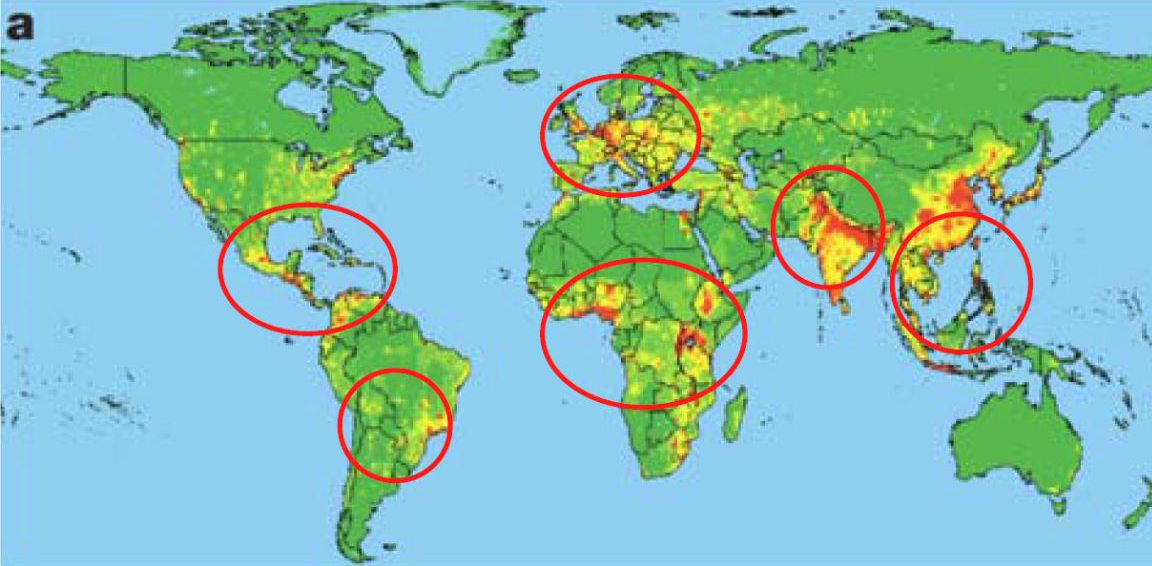Although the winter has come, the pace of the spread of swine fever in Africa has not slowed down, and the spread of the epidemic has been severe, even intensified. In November alone, 19 cases of swine fever occurred in Africa, involving 9 provinces and cities, including 5 provinces and cities for the first time.
At 16:00 on November 17, the Ministry of agriculture and rural areas received a report from the China animal epidemic prevention and control center. After being confirmed by the China Center for animal health and epidemiology (the National Center for the study of animal epidemics in foreign countries), the whole life pig farmers in Jinshan District of Shanghai discharged and found out the situation of swine plague in Africa. Up to now, there are 314 live pigs, 50 sick and 11 dead.
On November 19, two pig farms in Daowai District, Harbin City, Heilongjiang Province "checked out" the epidemic situation in Africa. Of 900 pigs on hand, 269 were sick and 269 died.
At 19:00 on November 20, a farmer in Hecheng District, Huaihua City, Hunan Province found out the situation of African swine fever. Up to now, there are 73 live pigs, 61 sick and 55 dead.
So far, there have been 67 cases of swine fever in Africa in 19 provinces of China since August. More than 470000 infected pigs have been disposed of and the economic loss has exceeded 800 million yuan.
There have been outbreaks including a number of large-scale pig farms with more than 7000 pigs.
On October 15, a farm in Beizhen City, Jinzhou City, Liaoning Province was screened, with 19938 pigs on hand; on October 27, a farm in Taoyuan County, Changde City, Hunan Province, with 7684 pigs on hand; on November 10, a farm in Qingyang County, Anhui Province, with 8339 pigs on hand.
It was found that 10 listed companies were affected by the epidemic. Among them, Dabei Nong and Shuanghui development have slaughtered the pig farms involved in the epidemic; xinwufeng is expected to lose 45 million yuan to 67.5 million yuan in the whole year; tianbang shares and Wenshi shares will speed up the marketing plan; muyuan shares, young eagle agriculture and animal husbandry, Longda meat will face the decline of the average sales price; new hope and aonong biology plan to adjust the industrial layout.
CSFV epidemic in Africa should not be underestimated
1921 the first non classical swine fever was confirmed in Kenya, Africa.
1957 into Europe
1971 invasion of the United States
In 2007, it first spread to Georgia in Eurasia. Then it spread to Russia and bred in the Caucasus.
In 2012, it invaded Ukraine,
In 2013, it invaded Belarus.
In 2014, it invaded Poland, Lithuania, Latvia and Estonia
2016 invasion of Moldova
2017 invasion of Czech Republic, Romania
2018 invaded our country.

From the perspective of domestic transmission path, at present, the epidemic has spread from the north of China to the hinterland of the south, and the four provinces of Heiji, Liaoning, Inner Mongolia in the northeast and Yunnan, Guizhou, Sichuan and Chongqing in the southwest are in regional "enemy occupied". In addition to Shandong, Sichuan, Henan, Hunan and Hubei are the top five pig breeding provinces in China, which means that it is a wrong attempt to gradually liberalize pig transportation in multiple epidemic areas, and it is almost impossible to transfer pigs across provinces. According to the requirements of the Ministry of agriculture and rural areas on the supervision of the trans provincial transfer of pigs and their products, the trans provincial transfer of pigs in 29 provinces (cities and districts) except Hong Kong, Macao, Taiwan, Xinjiang and Hainan has been suspended.
However, it is worth noting that from November 5 to November 11, 2018, the number of domestic animals and poultry transferred across provinces was 114.676458 million, up 1.6% month on month. Among them, 463800 pigs were born, up 24.11% on a month on month basis; 11388096200 poultry, up 1.61% on a month on month basis.
The reasons are as follows:
As the national unified market was broken, some illegal elements, driven by interests, transferred pigs from high-risk provinces to cross provincial sales to earn the difference. Such illegal behaviors occur from time to time, which aggravates the further spread of the epidemic.
There are several cases that have been exposed, all of which are caused by farmers who want to make money from swine fever and secretly smuggle live pigs. Some small farmers are often driven by interests, not through the epidemic prevention department, not taking the road with cards, secretly transporting from the trail, which is very difficult to prevent in reality. The situation of swine fever in China has not been alleviated, which is related to the phenomenon of illegal transportation of live pigs.
To sum up, under the embargo in most parts of the country (live pigs), the statistics increased by 24.11%, and the problems and consequences are worth pondering.
On November 21, the Ministry of agriculture and rural areas issued a notice on printing and distributing eight bans on the prevention and control of swine fever in Africa. The prohibition includes eight articles, which are strictly prohibited from concealing, misreporting, delaying, failing to report and hindering others from reporting animal epidemic situation, strictly prohibited from failing to perform the duties of animal epidemic disease detection and issuing false detection reports.
In addition, the notice requires all localities to focus on strengthening the supervision of the trans provincial transfer of pigs. In case of illegal transfer of pigs and pig products, it is not allowed to persuade them to return and immediately detain and standardize the disposal.
Eight prohibitions are as follows:
1、 It is strictly prohibited to conceal, misrepresent, delay, omit or obstruct others from reporting animal epidemic situation;
2、 It is strictly prohibited to refuse to accept or check the animal epidemic report;
3、 It is strictly prohibited that animal epidemic investigation is not conducted on site or in place;
4、 It is strictly prohibited to fail to perform the duties of animal disease detection and issue false detection reports;
5、 It is strictly prohibited to issue certificates without quarantine inspection or in violation of regulations;
6、 It is strictly prohibited to use or resell the animal health certificate and seal in violation of regulations;
7、 It is strictly prohibited to dispose of animals, animal products and related articles infected with or suspected to be infected with epidemic diseases in violation of regulations;
8、 It is strictly prohibited not to investigate and deal with any illegal act.








